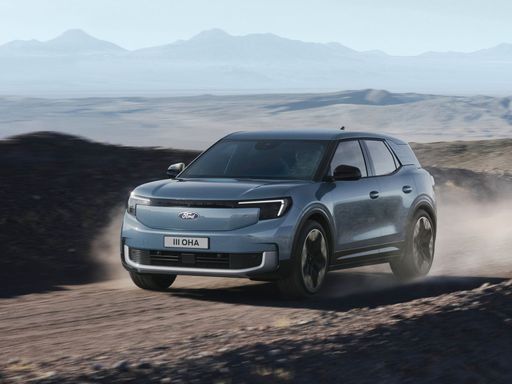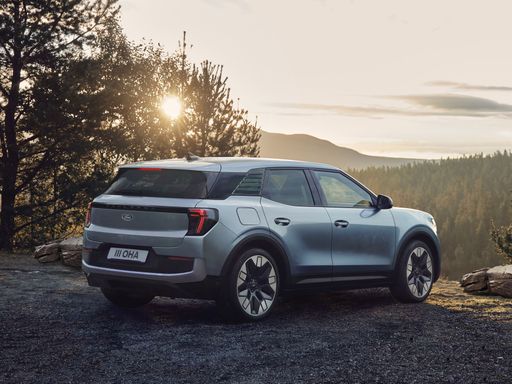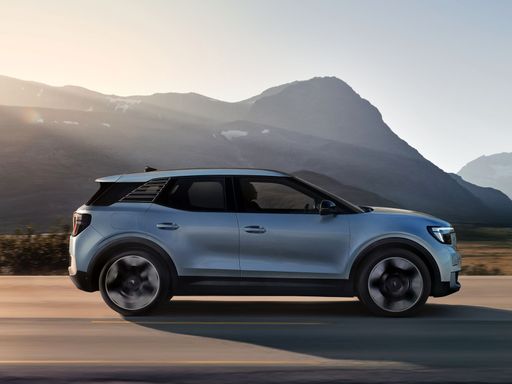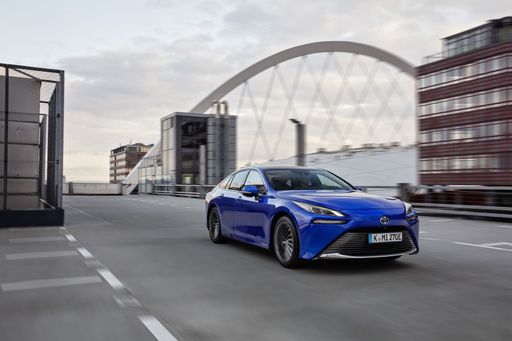Ford Explorer EV vs Toyota Mirai – Differences & prices compared
Compare performance, boot space, consumption and price in one view.
Find out now: which car is the better choice for you – Ford Explorer EV or Toyota Mirai?
The Ford Explorer EV (SUV) comes with a Electric engine and Automatic transmission. In comparison, the Toyota Mirai (Sedan) features a Hydrogen engine with Automatic transmission.
When it comes to boot capacity, the Ford Explorer EV offers 450 L, while the Toyota Mirai provides 300 L – depending on how much space you need. If you’re looking for more power, decide whether the 340 HP of the Ford Explorer EV or the 182 HP of the Toyota Mirai suits your needs better.
In terms of consumption, the values are 14.50 kWh per 100 km for the Ford Explorer EV, and for the Toyota Mirai.
Price-wise, the Ford Explorer EV starts at 34200 £, while the Toyota Mirai is available from 58700 £. Compare all the details and find out which model fits your lifestyle best!
Ford Explorer EV
The Ford Explorer EV marks a significant step forward in the brand's journey towards electrification, offering an impressive blend of performance and sustainability. This modern SUV features a sleek design complemented by advanced technology that enhances the driving experience. With a focus on comfort and innovation, the Explorer EV aims to redefine family travel for the electric age.
details @ electricexplorer.fordpresskits.com
@ electricexplorer.fordpresskits.com
 @ electricexplorer.fordpresskits.com
@ electricexplorer.fordpresskits.com
 @ electricexplorer.fordpresskits.com
@ electricexplorer.fordpresskits.com
Toyota Mirai
The Toyota Mirai represents a groundbreaking step in hydrogen fuel cell technology, offering an eco-friendly alternative to traditional petrol engines. Its sleek design and futuristic aesthetic make it a standout on the road, while the interior combines comfort with cutting-edge features. With its impressive range and quick refuelling capabilities, the Mirai is paving the way for the future of sustainable motoring.
details @ Toyota
@ Toyota

|

|
|
|
|
Costs and Consumption |
|
|---|---|
|
Price
34200 - 48800 £
|
Price
58700 - 66700 £
|
|
Consumption L/100km
-
|
Consumption L/100km
-
|
|
Consumption kWh/100km
14.5 - 17.2 kWh
|
Consumption kWh/100km
-
|
|
Electric Range
360 - 602 km
|
Electric Range
650 km
|
|
Battery Capacity
52 - 79 kWh
|
Battery Capacity
-
|
|
co2
0 g/km
|
co2
-
|
|
Fuel tank capacity
-
|
Fuel tank capacity
5 L
|
Dimensions and Body |
|
|---|---|
|
Body Type
SUV
|
Body Type
Sedan
|
|
Seats
5
|
Seats
5
|
|
Doors
5
|
Doors
4
|
|
Curb weight
1908 - 2179 kg
|
Curb weight
1900 - 1930 kg
|
|
Trunk capacity
445 - 450 L
|
Trunk capacity
300 L
|
|
Length
4468 mm
|
Length
4975 mm
|
|
Width
1871 mm
|
Width
1885 mm
|
|
Height
1630 - 1639 mm
|
Height
1470 mm
|
|
Payload
561 - 585 kg
|
Payload
485 - 515 kg
|
Engine and Performance |
|
|---|---|
|
Engine Type
Electric
|
Engine Type
Hydrogen
|
|
Transmission
Automatic
|
Transmission
Automatic
|
|
Transmission Detail
-
|
Transmission Detail
-
|
|
Drive Type
Rear-Wheel Drive, All-Wheel Drive
|
Drive Type
Rear-Wheel Drive
|
|
Power HP
170 - 340 HP
|
Power HP
182 HP
|
|
Acceleration 0-100km/h
5.3 - 8.7 s
|
Acceleration 0-100km/h
9.20 s
|
|
Max Speed
160 - 180 km/h
|
Max Speed
175 km/h
|
|
Torque
310 - 679 Nm
|
Torque
300 Nm
|
|
Number of Cylinders
-
|
Number of Cylinders
-
|
|
Power kW
125 - 250 kW
|
Power kW
134 kW
|
|
Engine capacity
-
|
Engine capacity
-
|
General |
|
|---|---|
|
Model Year
2024 - 2025
|
Model Year
2021 - 2022
|
|
CO2 Efficiency Class
A
|
CO2 Efficiency Class
-
|
|
Brand
Ford
|
Brand
Toyota
|
Ford Explorer EV
Unveiling the Future: The Ford Explorer EV
The all-new Ford Explorer EV makes a bold statement in the electric vehicle market with its amalgamation of cutting-edge technology, expansive features, and forward-thinking design. As Ford moves towards a more sustainable future, the Explorer EV stands out as a prime example of the brand's commitment to innovation and performance.
Power and Performance
Beneath its stylish exterior, the Ford Explorer EV boasts a powerful electric motor offering a range of power outputs from 170 PS to an impressive 340 PS. The vehicle provides either rear-wheel drive or an advanced all-wheel-drive system that ensures optimal traction and stability under diverse driving conditions. Thanks to its rapid acceleration, the Explorer EV races from 0 to 100 km/h in as little as 5.3 seconds, while maintaining a top speed of 180 km/h across its variants.
Battery Efficiency and Range
A major highlight of the Explorer EV is its varied battery options, which define its 'Standard Range' and 'Extended Range' models. With capacities ranging from 52 kWh to 79 kWh, the EV offers an impressive driving range of up to 602 km on a single charge. The electric consumption holds remarkable efficiency, varying between 13.9 kWh/100km and 16.6 kWh/100km, highlighting Ford’s innovation in energy management.
Interior Comfort and Technology
Inside, the Explorer EV exudes comfort with its high-quality materials and a spacious layout that accommodates up to five passengers. The vehicle is available in several trim levels, including the luxurious 'Premium' and 'Limited Edition', each outfitted with state-of-the-art technology. Drivers benefit from an intuitive infotainment system, comprehensive digital displays, and a variety of connectivity options that make every journey pleasurable and efficient.
Safety and Sustainability
Safety remains a priority for Ford, evident in the Explorer EV's suite of advanced safety features. The vehicle is equipped with cutting-edge driver-assistance technologies that work tirelessly to safeguard passengers with features such as adaptive cruise control and lane-keeping assist. Moreover, as a zero-emission vehicle, it proudly boasts a CO2 efficiency class rating of A, underpinning its eco-friendly credentials and Ford’s commitment to reducing the carbon footprint.
Pricing and Availability
The Ford Explorer EV is set to make waves with its competitive pricing. Starting between €42,500 and €57,200 depending on the trim and features, it offers exceptional value for those looking for a high-performing and sustainable SUV. The 2024 model is now available for order and promises to redefine expectations in the electric SUV segment.
Final Thoughts
The Ford Explorer EV embodies a harmonious blend of style, efficiency, and technological innovation. As a harbinger of Ford's electric future, it promises not just to meet but exceed the expectations of modern consumers by delivering an exceptional driving experience that is both versatile and responsible.
Toyota Mirai
The Future of Driving: Introducing the Toyota Mirai
The Toyota Mirai represents a significant leap forward in automotive innovation, being one of the leading vehicles in the hydrogen fuel cell market. As we continue to search for sustainable transportation solutions, the Mirai stands out with its pioneering technology and exceptional driving features.
Revolutionary Hydrogen Fuel Cell Technology
At the heart of the Toyota Mirai is its groundbreaking hydrogen fuel cell system. Unlike conventional internal combustion engines, the Mirai uses a fuel cell stack to generate electricity through the chemical reaction between hydrogen and oxygen. This process not only powers the car with zero emissions—producing only water vapour as a byproduct—but also delivers a smooth and silent drive.
Technical Specifications and Performance
The Toyota Mirai is designed with performance in mind. It boasts a power output of 182 PS (134 kW) and delivers a robust 300 Nm of torque, allowing it to accelerate from 0 to 100 km/h in just 9.2 seconds. While its top speed is a respectable 175 km/h, it's the Mirai's impressive range that really stands out. The vehicle can travel up to 650 km on a single hydrogen fill-up, making it a practical choice for long-distance travel.
Sophisticated Design and Comfort
Designed as a saloon, the Toyota Mirai combines aesthetic appeal with comfort. Its dimensions—4975 mm in length, 1885 mm in width, and 1470 mm in height—provide a spacious interior for five passengers. The design is sleek and modern, reflecting its advanced engineering. The boot offers 300 litres of storage, suitable for everyday needs.
Advanced Features and Safety
The Toyota Mirai doesn't just excel in propulsion technology; it also includes a range of advanced features to enhance driver comfort and safety. Available in three trims—Advanced, Executive, and Luxury—the Mirai includes state-of-the-art safety systems and infotainment options to ensure a connected and secure driving experience.
Cost and Efficiency
While the price of the Toyota Mirai ranges from €65,990 to €76,290, its monthly running costs—estimated between €1,496 and €1,672—and per kilometre costs of 59.9 to 66.9 cents, reflect the efficient nature of hydrogen-powered vehicles. Considering its innovative technology, the Toyota Mirai offers excellent value for those looking to invest in the future of eco-friendly transport.
The Toyota Mirai: Driving Towards a Sustainable Future
Overall, the Toyota Mirai is more than just a car; it's a vision for the future of sustainable transportation. With its cutting-edge hydrogen fuel cell technology, impressive range, and commitment to zero-emissions driving, the Mirai sets a new standard in environmentally conscious car design. Whether you're an eco-enthusiast or just someone seeking a reliable and technological advanced vehicle, the Toyota Mirai is worth considering.
The prices and data displayed are estimates based on German list prices and may vary by country. This information is not legally binding.
